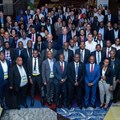This year's Conference on Land Policy in Africa, 25-29 November, is themed 'Winning the fight against corruption in the land sector in Africa'. In collaboration with the African Union Commission and the United Nations Economic Commission for Africa, the African Development Bank is hosting this third edition in Abidjan, Côte d'Ivoire.

Cosmas Milton Ochieng, director of the African Natural Resource Centre at the African Development Bank
Cosmas Milton Ochieng, an expert in natural resource governance and economic development in Africa and director of the African Natural Resource Centre at the African Development Bank, shares key insights into why the conference matters for Africa.
Why does the 2019 Conference on Land Policy in Africa matter?
Cosmas Milton Ochieng: This conference matters for Africa because land is central to social, economic and political development in Africa. Land in Africa is not simply an economic or an environmental asset. It is also a social and cultural resource. It was at the heart of many anti-colonial movements on the continent. It remains an important factor in the construction of social identity and the organisation of the religious, cultural and economic lives of many African communities.
Africa is home to 60% of the world’s unutilised but potentially available cropland. In 30 years, about half the world’s agricultural land will come from Africa. How Africa manages its land is therefore critical to its future social, economic and environmental well-being.
This conference explores the ways in which Africa can harness its land resources for its accelerated sustainable development.
What is the role of the African Development Bank and how can it help enhance transparency and accountability in land governance?
Ochieng: The African Development Bank is a co-founding anchor of the African Land Policy Centre (ALPC). The ALPC is a joint initiative of the African Development Bank, the African Union Commission (AUC) and the UN Economic Commission for Africa (ECA). The ALPC facilitates and coordinates the implementation of policy goals outlined in the AU Agenda on Land. The biennial land conference is one of the flagship activities of the ALPC.
In addition to its technical support to the ALPC, the African Development Bank supports the implementation of the African Union Agenda on sound land administration, management and governance, including transparency and accountability through the work of its various departments.
The African Development Bank, through its ten-year strategy (2013-2022) and its high five priorities, invests in its regional member countries to help maximise development outcomes derived from land.
The bank also provides independent advice and technical assistance to countries to ensure sustainable development and management of land.
For instance, the African Natural Resources Centre at the Bank generates knowledge and provides institutional capacity building and strategic guidance on land administration and governance, investment and planning. Over the last five years, the African Natural Resources Centre has worked very closely with the government of Liberia to help the build capacity of the Liberia Land Commission, and to help review the National Land Rights Policy and the Alternate Dispute Resolution Mechanism. In Togo, the African Natural Resources Centre worked with the government to help facilitate a national dialogue on the country’s draft land policy and codes.
In Botswana, Rwanda, Malawi, Burundi, Tanzania, Kenya, Cameroon, Nigeria, Côte d’Ivoire and Senegal, the African Natural Resources Centre has conducted studies aimed at informing the review of land tenure systems. In the Democratic Republic of Congo, the African Natural Resources Centre has just initiated a pilot project on Farmer Registration and Land Digitalization (FRLD). The Farmer Registration and Land Digitalization Model was developed by the Bank’s own Statistics Department and seeks to enhance land registration, transparency and accountability.
How does the theme of the conference align with the African Union Declaration of 2018 as Africa’s Anti-Corruption Year?
Ochieng: The theme of this year’s Conference on Land Policy in Africa is 'Winning the fight against corruption in the land sector in Africa'. This theme supports the AU designation of 2018 as the year of anti-corruption.
This theme also highlights the bank’s commitment to sound governance, transparency and accountability in African natural resource governance and is consistent with the bank’s governance policy and work on combating corruption and illicit trade in the African natural resource sector.
What are the expectations for this year’s conference?
Ochieng: This year’s conference seeks to enhance commitment to capacity strengthening for land policy development and administration in Africa through improved access to knowledge on combatting corruption in the land sector. The conference also seeks to enhance partnerships and networks and to mobilize resources for promoting good governance in the African land sector.



























